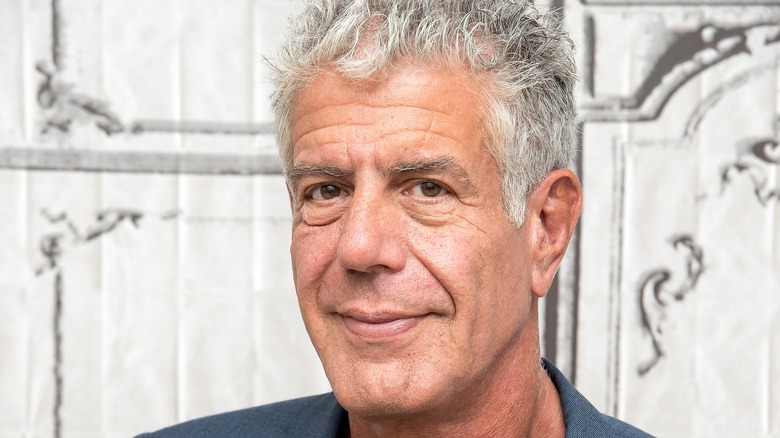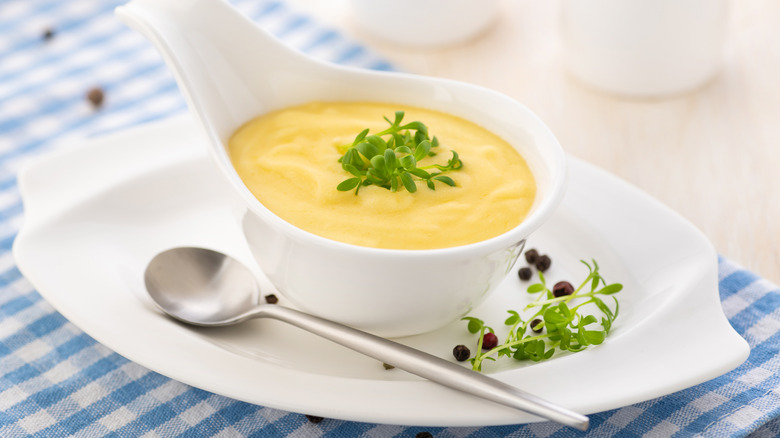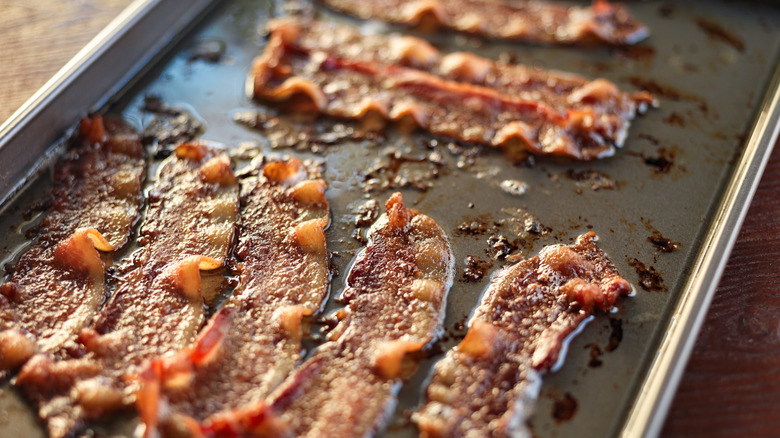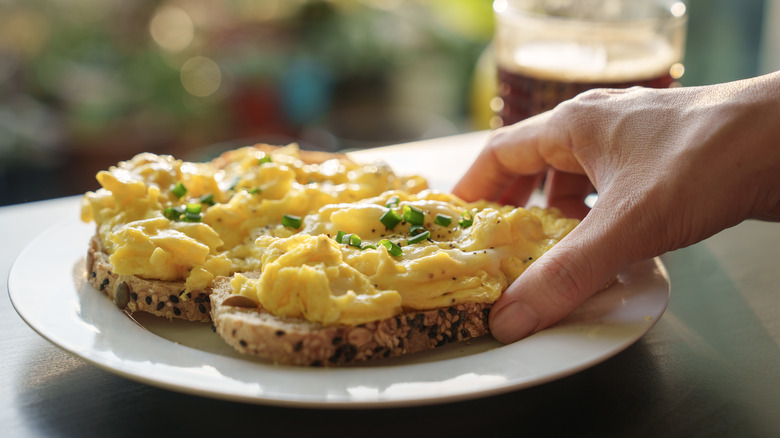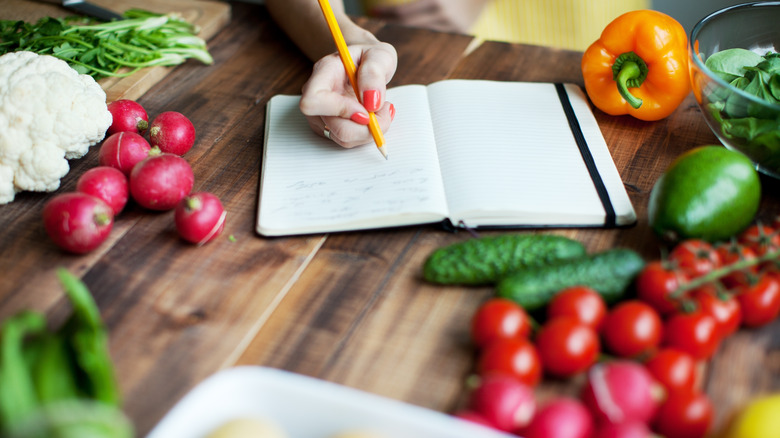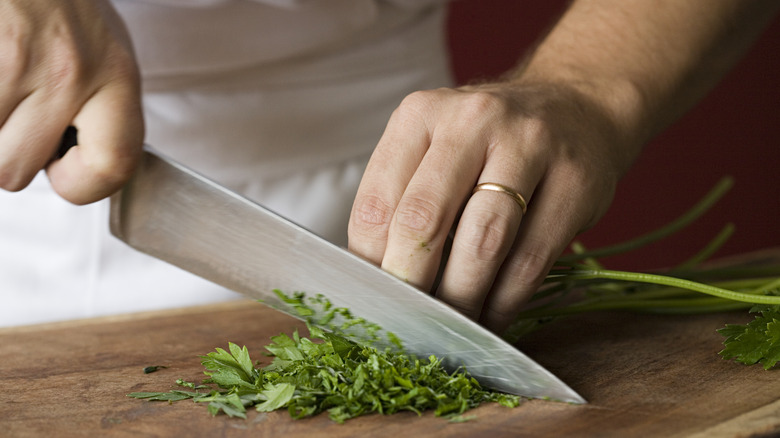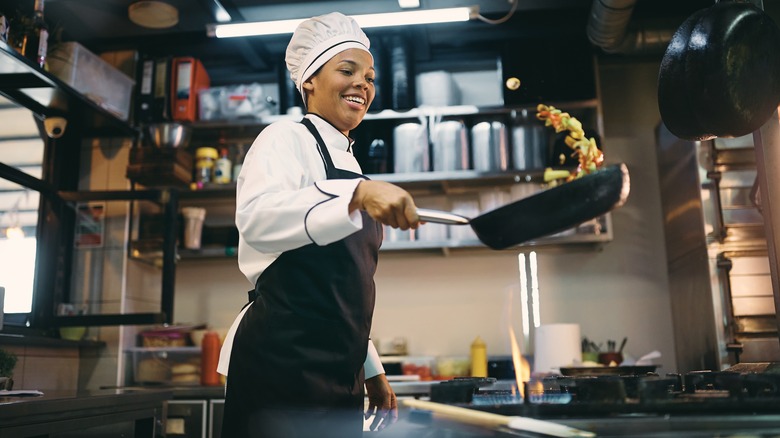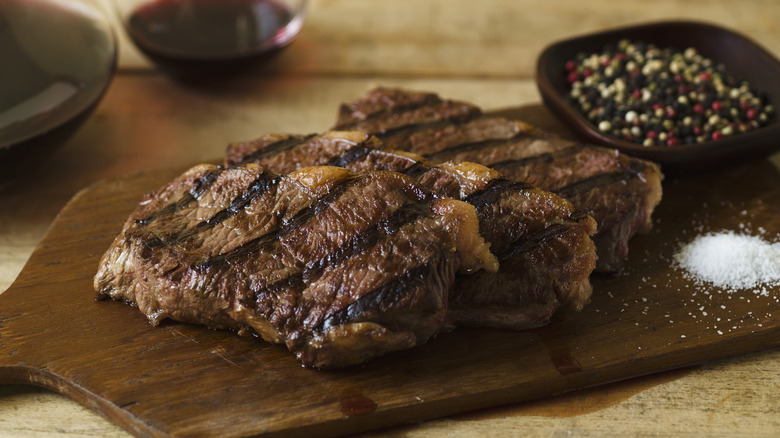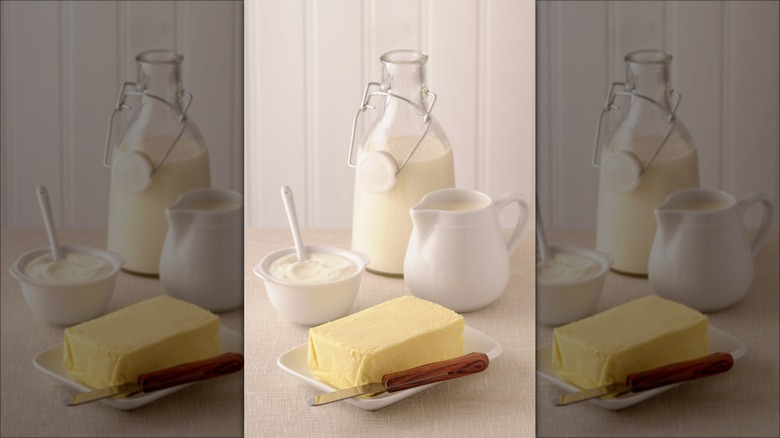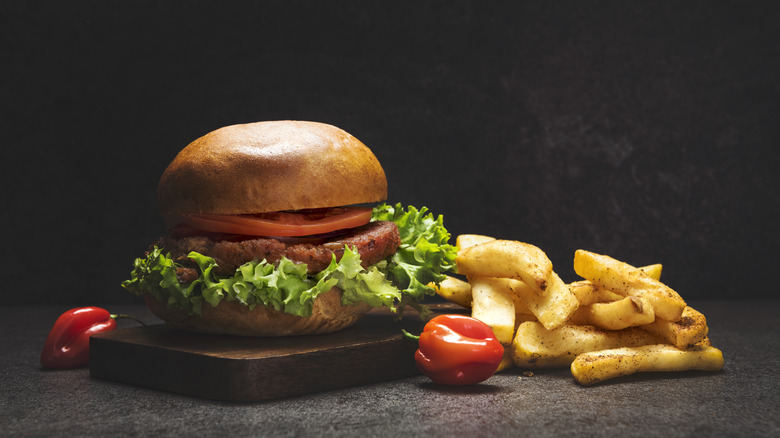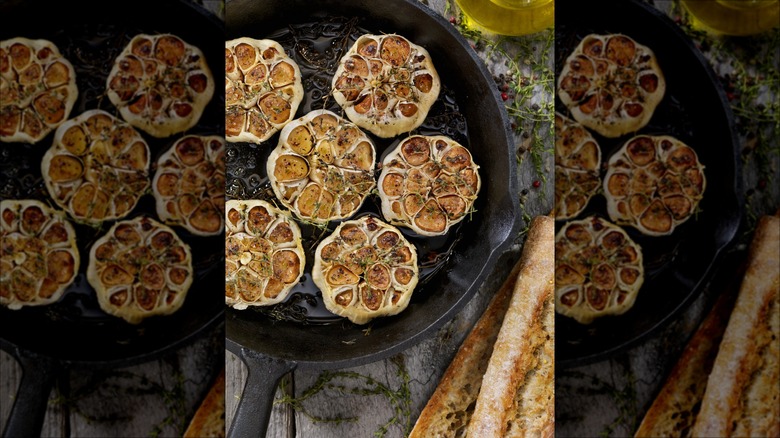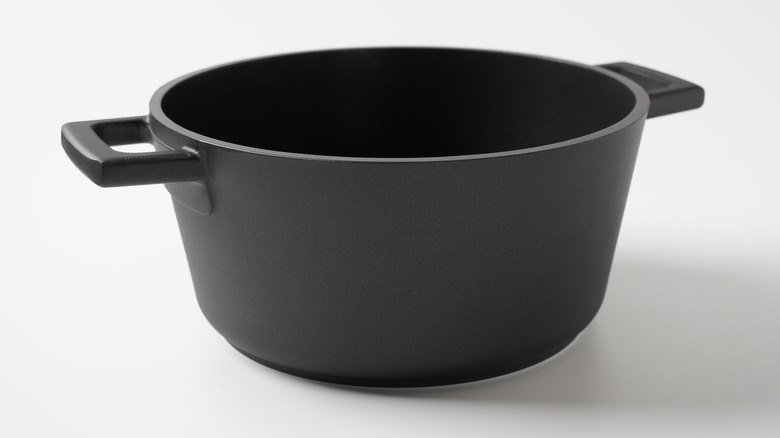12 Genius Cooking Tips Anthony Bourdain Swore By
Because Anthony Bourdain left such a mark as a writer and travel journalist, it's easy to sort of forget that he spent decades working in restaurant kitchens. Chef Bourdain's first restaurant job saw him working as a dishwasher in a restaurant called The Flagship in Provincetown, Massachusetts before he graduated into a learn-as-you-go cook at Ciro & Sal's. And, it certainly doesn't hurt that he graduated from the Culinary Institute of America, or CIA as he liked to call it in his book "Kitchen Confidential." That kind of experience turns a person into a cook who knows how to put out grease fires, who knows what remedies cure oversalted food, and who knows how to put a lid on tempers before the Saturday night dinner rush goes bust because of it.
While we'll never have the pleasure of working side-by-side with him in one of his restaurants, the numerous TV shows, books, and interviews he left behind have much to tell us about his cooking know-how. In these works, we see his years of experience and soak in the wisdom of a man who became more than a famous chef. He became a statesman for this great industry and the people who work in it. He might be gone, but we foodies continue to learn great cooking tips from him to this day. Here are 12 of our favorite cooking hacks, along with the wisdom they impart, by Anthony Bourdain.
1. Hollandaise sauce is hard to make, so keep trying
It is with good reason that Anthony Bourdain warned novice chefs about the perils of hollandaise sauce. In this book, "Appetites," Bourdain calls it a process "where people try and fail and try and fail." This is because making hollandaise sauce requires chefs to master the emulsion process, which prompts them to mix and keep together, two liquids that usually blend together about as well as oil and water.
Done just right, this savory eggs Benedict topping shows off a chef's ability to mix hot, melted butter into a pool of lemon juice and egg yolks without a hitch. A seasoned chef makes the process look easy. It's not. To add another ball or two to this juggling act, chefs must also deal with hot eggs that might just be on the verge of scrambling at any time during the hollandaise-making ritual.
Working under the mentorship of a more experienced chef helps. But, if you happen to be making hollandaise by yourself for the first time — or even if you're not — you may find comfort in Chef Bourdain's wise counsel if things don't go exactly according to plan the first time around (or even the tenth).
2. When making bacon, the oven is your friend
When it came to making the best bacon at home, Anthony Bourdain employed a trick he learned while working in restaurants. He rolled out the parchment paper and lined it, row upon row, with slabs of bacon. He then set the oven to 350 degrees Fahrenheit and slid the bacon onto the oven rack. It was a hack that he suggested others use, too.
Despite the number of times you may have to run to the oven to check on the bacon to ensure it doesn't overcook, this method of cooking bacon offers a couple of advantages. First, for those who don't want their house or apartment to smell like bacon for days, this method puts a lid on the overpowering bacon smell that comes from frying it in a pan.
Second, it reduces the likelihood that the cook (or some bystander) gets nipped by the spits of bacon grease that fly out of the pan. Putting the bacon in the oven mitigates some of the potential hazards that come with the spitting sizzle of the bacon that cooking it on the stovetop brings with it. The third advantage is that oven-cooked bacon gets more evenly cooked. In other words, oven-cooked bacon is just right, crispy from end to end.
3. Don't let whipped eggs sit
Anthony Bourdain learned a thing or two about cooking eggs. To start off with, he swore by starting with fresh eggs, which he cracked on a flat surface instead of the edge of the counter. This cracking method prevents little bitsy shards of eggshells from mingling with the eggs. Once the egg was cracked, he recommended dropping the egg into a small dish or cup. It's easier to inspect for stray eggshell bits this way instead of trying to fish them out of a hot pan.
Before cooking, he whipped the eggs with a fork. He did this immediately before he poured them into a hot pan, sizzling with butter. The celeb chef never whipped the eggs and then let them sit. That produced what he called an "odd greying, stippling effect," per Insider Tech. Other than salt and pepper, the eggs got nothing. No water. No cream. Just egg to make it about the egg. And, if you've ever made scrambled eggs that looked like tiny bits of torn fluff, he had some advice for that, too. Fold the egg in a figure-eight pattern while you cook it for maximum fluff factor.
4. Develop a system to organize your cooking
A place for everything and everything in its place. This old adage works as well for cooking as it does for general home organization and upkeep. And, it's a philosophy that Anthony Bourdain lived by, except in the cooking world, this concept is called "mise-en-place." Essentially, he advised would-be cooks to lay out everything necessary for the job: the tools, the ingredients, the seasonings ahead of time. For the professional line cook, mise-en-place ensures that everything's within reach, and all the components that go into a night's work are within arm's length before the cooking ever starts.
The philosophy works just as well for home cooks, too. And, it goes beyond just what's in front of you. For example, if you're planning on making a recipe, a list of ingredients is your insurance policy against forgotten items. That list goes to the store with you, sits on the counter while you organize your cooking tasks, and maybe even sleeps under your pillow in the days before you begin the grand cooking experiment. In other words, preparation may be the most critical aspect of cooking, even more so than investing in a set of steak knives or cook pots. Professional cooks start their days with prep. If you aspire to cook well, take a page from the pro cook's handbook and try mise-en-place in your home kitchen.
5. Knife skills can make or break you as a cook
Having mad knife skills kinda goes with the territory of being a pro cook, and Anthony Bourdain went as far as saying it's the first, most basic skill that a chef can have. And, while most aspiring cooks won't get to the knife skill level of say, a hibachi chef, the celebrity chef maintained that proper knife skills meant the difference between sustaining a major injury that parted cook from thumb or walking away relatively unscathed. Proper knife skills also play a key role in a chef's efficiency levels.
The trick's in the hand position. Cooks shouldn't place their non-cutting hand with the thumb positioned parallel to the knife. Instead, that hand should have the fingers at a 45-degree angle to the knife, with the knuckles facing the knife blade. It's not that a slip-of-the-knife can't happen with the hands in such a position, but less damage is done if there is an accident.
Aside from this, Chef Bourdain swore that it was best just to have one really good chef's knife instead of a set of fancy schmancy knives. And, what is the gold-standard chef's knife according to the famous chef? Anthony Bourdain loved the Global Chef's Knife his whole career.
6. Practice and repetition make perfect
If you haven't read Anthony Bourdain's book "Kitchen Confidential," you're missing out not only on his mesmerizing prose but also on his honest assessment of his pre-professional chef skill levels. Burned fingers that caused him to drop pans of hot food mid-shift count among the earliest wounded warrior woes he experienced in the early days of his career. It was baptism by fire, literally sometimes, with him making all of the mistakes that come with being a novice in the kitchen.
It seems even professional chefs don't fall onto the mountaintop. They climb, slide back, and tumble head over heels back down the mountain a few times on the way to the top, including him. Anthony Bourdain's advice for weathering this storm is to "Cut yourself some slack," he said in an interview with the Globe and Mail. Most aspiring chefs screw up a lot. It's part of the learning curve for the job. Getting better requires repetition and some more repetition. Certain recipes trip the newbie up until, well, they don't. And then, when you get it right, just keep on keeping on.
7. Let steak sit for a few minutes
Cooking a steak properly is a bit like stopping a coal-powered boat in a river. Just because the flame's off doesn't mean the boat stops moving or the steak stops cooking. At least, not right away, it doesn't. For this steak-cooking dilemma, Anthony Bourdain suggested leaving the steak alone at room temperature for a few minutes. No poking. No prodding. No slicing it to see if it's done. He advised home cooks not to touch it at all. Granted, his way of expressing this idea was slightly more colorful than ours and required words that would get you sent to the principal's office in grade school.
Bourdain advises that after removing the steak from the heat, it should be left at room temperature for five to seven minutes. The juices naturally disperse throughout the steak, and the little pink cloud in the middle of a perfectly cooked steak starts to form.
As for seasoning it, because salt pulls moisture out of meat, he cautioned against salting it late in the game. Instead, the celeb chef preferred to rub sea salt and cracked black pepper on the steak right before he threw it on the grill, making for a nicely seasoned, still juicy steak.
8. Use butter and sugar on vegetables
If only the vegetables we made at home tasted as supreme as those we've had in a restaurant. Then, we'd all be way healthier because we'd be eating more vegetables, right? According to Anthony Bourdain, not so much. The celeb chef admitted that the first ingredient in many of his dishes was not the actual main ingredient but butter. And, it was the last ingredient before he plated up the dish for serving. In other words, classic dishes like carrots Vichy are basically butter with a few carrots tossed in and quite a bit of sugar added for good measure.
Butter and sugar are why your veggies never seem to replicate those you've had at your favorite French restaurant. Butter, especially, is an ingredient that's chef's gold. Aside from making things taste good, butter gives foods what Chef Bourdain called "the restaurant sheen," on The Oprah Winfrey Show, which appeals to the eyes and the appetite. So, if your carrots or Brussels sprouts don't seem to have enough sparkly bling, try a little sugar or butter to make everything look and taste a bit better. Viva butter and sugar!
9. Burgers should be simple
As foodies who also like to road trip, we approve of what Anthony Bourdain said about the makings of a good burger. You should be able to eat it with one hand. This one-handed burger represents road-food Nirvana. No knife. No fork. Just one hand on the wheel and the other hand on the burger.
As such, in our own burger-making activities, we should avoid adding things to the burger that mess with the structural integrity and make it less "one-handed," like adding too many tomatoes or too much lettuce. Ideally, biting into this burger gives the taste buds a little bit of each of the burger's elements, from the potato bun — that Bourdain loved so much — to the ketchup that tops said bun. And, again ideally, if you construct the burger correctly, you won't walk away from the experience with ketchup stains and grease marks on your shirt. Melted processed cheese snuggles up nicely to the taste buds on the classic burger, so be sure to include a bit of that on the next burger ala Bourdain that you make.
And, if you get this far and still are in doubt about your attempts to make a great, classic burger, Chef Bourdain suggested asking yourself one simple question, per Insider Tech. "Am I making it better?" If you don't have a better burger as a result of your efforts, it's best to try again.
10. Keep some must-have ingredients on hand at all times
When would-be chefs aspire to the level of mastery that someone like Anthony Bourdain attained, it's critical for them to know what such a chef's go-to ingredients are. There are foods and spices that form the building blocks on which professional cooks build many recipes and they always have them on hand. They also know the subtleties that each ingredient brings to the mix.
It was such a deep knowledge of ingredients, like butter, that allowed Bourdain to know exactly why cooking with margarine would never taste as good, handle as well, or in general have the same qualities as butter in a recipe. This ingredient was the first in the pan and the last in the pan when he cooked. He also apparently felt the same about ingredients like shallots, roasted garlic, and parsley. These and other fresh, simple ingredients made up part of his mice-en-place as a cook.
Having a readily available supply of these must-have ingredients allows pro cooks to mix and match them with confidence because experience tells them that such a combo probably tastes great, even if it's never been tried before. So, keep your own essential ingredients on hand and you may start to cook with the same agility that pro chefs do.
11. Cook in a heavy-bottomed pan
As both novice and experienced home cooks alike have probably discovered, setting up your kitchen gets spendy, particularly if you really want to own high-quality cooking equipment. One way around the issue of expense is to decide what equipment needs to be top-of-the-line and what doesn't. Anthony Bourdain maintained that if you're going to spend money on something, make it some solid, heavyweight cook pots. He loved them for making foods, like stew or soup and even stocks — "the backbone of good cooking" as Bourdain wrote in "Kitchen Confidential."
Indeed, if you've explored a few cookbooks, you've probably seen recipes that ask you to use a heavyweight or heavy-bottomed pan. Dutch ovens are bottom-heavy, for example, though they're not the only pots built like this. The rationale behind heavyweight pots comes down to the quality of the results you'll get from cooking in them. Because of the thicker bottom, the heat from the stove is absorbed by the pan more evenly, and subsequently, the ingredients inside the pan warm up at a more even rate. And, because foods cook at a more even rate in these types of pots, you'll run into fewer burned dinners and ruined recipes along the way.
12. Cook what you know when you have guests
On the one hand, the prospect of cooking for guests often inspires us to tap into our inner Anthony Bourdain. You might want to whip up some concoction that is sure to send your guests' taste buds into the stratosphere. On the other hand, trying out some new French number that requires a lot of scrambling, literal and figurative, won't do your party justice if you either burn the dish 'til it sticks to the pan or spend so much time in the kitchen trying to get everything right that your guests think you've Casper'd them.
When it comes to cooking for others, Anthony Bourdain had some pretty great advice: Cook what you know. Cook the recipe that represents the pinnacle of your skills today, not the skills you hope to have tomorrow. Dinner will taste good, and more importantly, it won't have so many parts unknown, as it were, that you can't spend most of the night hanging out with your guests.
And, if angst over the event still has a hold on you when your guests arrive, Bourdain suggests that you put on your restaurant employee hat for a minute and treat them like any other table in the restaurant. That should get you through the meal prep until it's time to sit down to feast with them. From there, you can put your friend and dinner host hat back on and enjoy the revelry of the evening.
